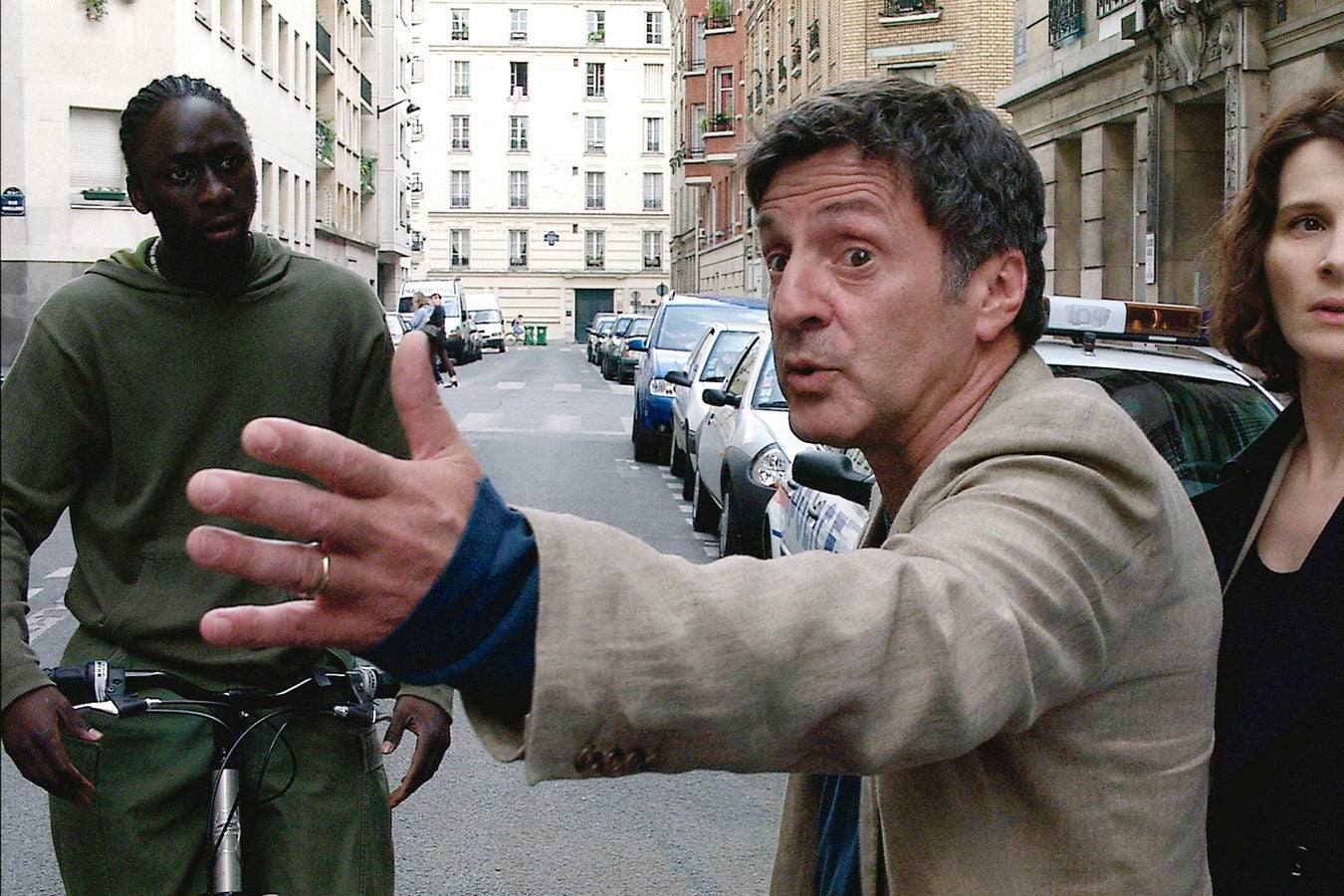Un film de Michael Haneke—the words signal a mugging. Don’t believe me? Here is a roundup of Haneke’s career thus far: In The Seventh Continent, a middle-class family smashes their material possessions, flushes wads of money down the toilet, then commits group suicide. In Benny’s Video, a teenage boy lures a young girl into his family’s apartment and kills her with a stun gun. A slice-of-life ensemble piece, 71 Fragments of a Chronology of Chance, is built around a killing spree. In the late 1990s Haneke, who is Austrian, started making movies in France. His budgets grew, he worked with celebrated French actresses (Isabelle Huppert, Juliette Binoche), and won the major prizes at Cannes. But his movies—why mess with a winning formula?—only got less appetizing. In Code Unknown, an Arab youth dresses down a pretty stranger, then spits in her face. In The Piano Teacher, a woman sits on the lip of her bathtub and slices her labia open with a razor blade. The Time of the Wolf opens with a husband being shot at close range; blood spatters on his wife; she stands stunned then vomits. “My films are intended as polemical statements against the American ‘barrel down’ cinema and its dis-empowerment of the spectator,” Haneke has said. Cannes, Binoche, polemical statements—do these movies deserve their aura of self-importance? Or are they fancy new stockings, filled with the same old Old Europe bullshit?
Haneke’s latest and most accomplished film, Caché, is now out in American art houses, and it is a neat little puzzle-box stocked with all of Haneke’s pet themes. A middle-aged married couple, a la modepublishing types, begin receiving videocassettes wrapped in violent, childlike drawings. Dumped anonymously on their doorstep, the videos contain mostly the same unwavering single-frame shot of the couple’s well-appointed townhouse. You are being surveilled, is their message, and very soon that sense of unease, so coolly and facelessly delivered, begins to undo the household. Caché is a genre thriller that, after a beautiful setup, robs you of the cathartic pleasures of a genre thriller; it’s a rebuke to all those barrel-down productions in which violence erupts, order is restored, and foreboding vanishes into the clear blue sky. Caché is instead an allegory for the degraded state of French-Arab relations, and an anatomy of the bad conscience of Georges (Daniel Auteiul), the husband, father, and would-be heroic defender of his family from menace.
In addition to coaxing staggering performance after staggering performance from his actresses—women always take the emotional temperature in Haneke’s films, and Binoche here is flawless—Haneke does possess a peculiar genius. He rarely uses music; often shoots in a single take; and, by placing otherwise harmless or familiar objects in unexpected places and unexpected sequences, produces this awful feeling of apprehension—as if, under all the normalcy, the guilty subconscious is always working on the coming night’s nightmare. But if Caché is the perfect vehicle for that genius, it is also the perfect rehearsal for Haneke’s shortcomings. He seems to have studied Lyotard and Bourdieu the way Brecht once studied Das Kapital, to encourage in himself (and others) a state of unremitting indignation, underwritten by a global theory of How Things Work. Once you get the hang of it, it’s not so complicated: Bobos live a privileged and largely spectatorial existence, the better to insulate themselves from a suffering they can be said to have caused. It’s Death Wish, only with the polarities reversed.
Haneke has been called the successor to Krzysztof Kieslowski, the director of The Decalogue and the Red, White,and Blue trilogy. True, both directors moved west to France, worked with Juliette Binoche, and depict a modern landscape of emotional and geographical dislocation. But Haneke lacks Kieslowski’s instinctive warmth and empathy, the basic unshakable faith that people deserve a home. No wonder that watching Haneke one always feels hectored. (Haneke is the worst sort of mugger; in return for your confiscated money, you get a lecture on your depravity.) Any work of art that embarrasses us for inclining toward warmth or decency (or, God forbid, humor) ought to be distrusted. On the other hand, I have found myself unable to shake Caché. I am still poring over its studied ambiguities, arguing with its facile-fashionable politics, poking its dead zones, to see if it might yield even a modest smile, a drop of social hope. Life is short, and one function of a critic is to grant permission to ignore pretentious bullies like Haneke. In this instance, though, permission denied. Go see Caché.
